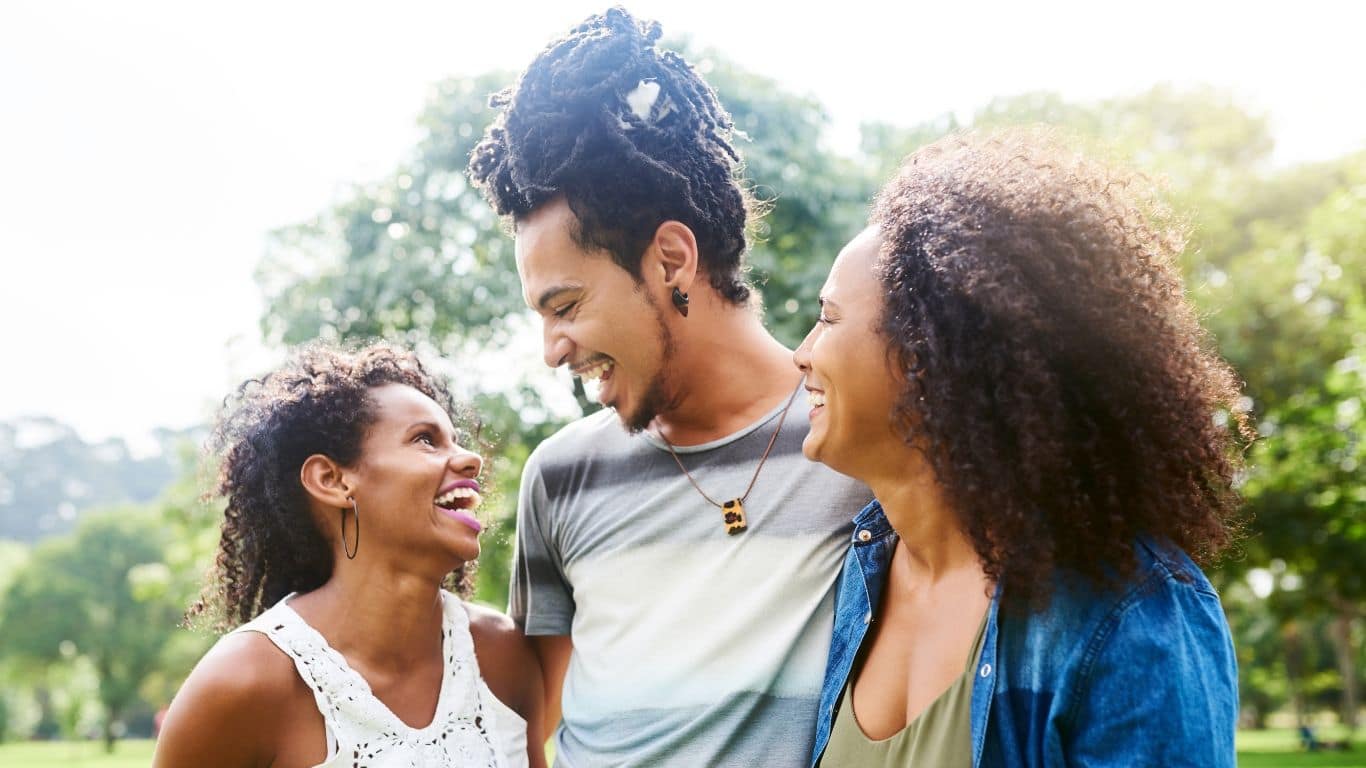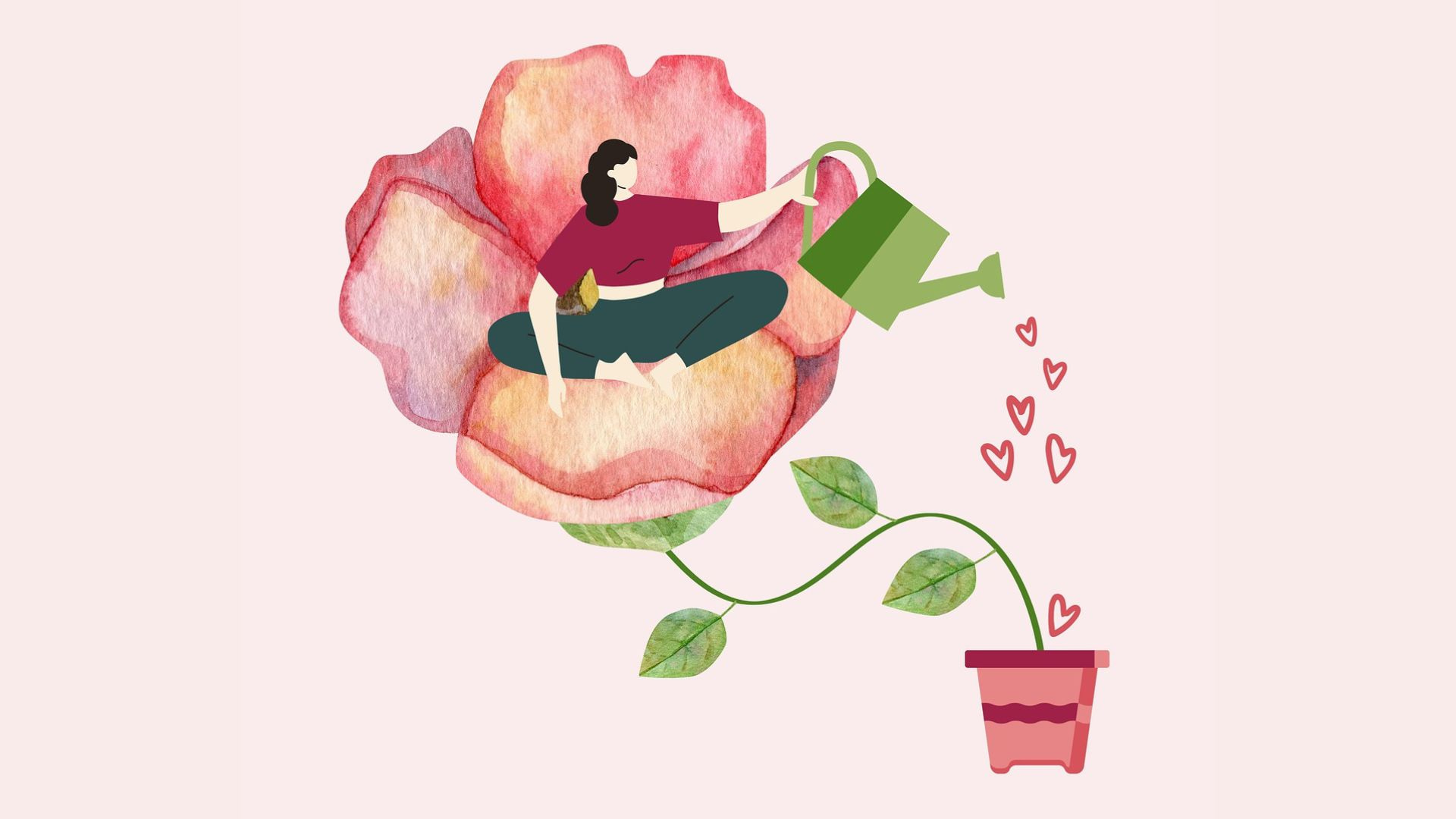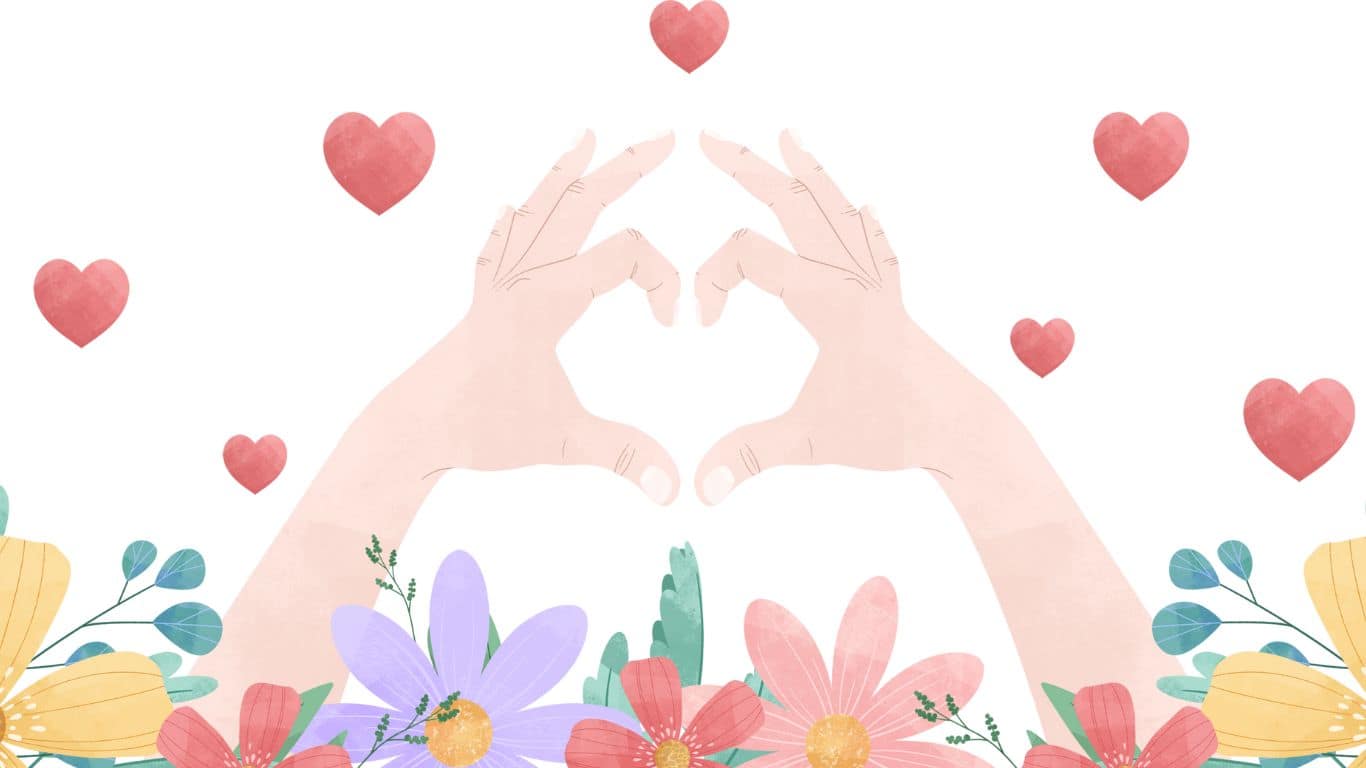Dating can be an exciting experience for anyone, but for those of us who practise ethical non-monogamy (I use the terms ethical non-monogamy and polyamory interchangeably in this article without ignoring the subtle differences between the two), it can feel like a completely different ballgame! I’ve been drawn to more than one person since I was a child, though I couldn’t articulate it at the time. I recall being eight years old and feeling so happy when I felt attracted to a boy and a girl in my class.
As I got older, I realized that my ideas about love and relationships were different from what society thinks is “normal.” Being true to myself wasn’t always accepted. Dealing with a world that mostly supports monogamy and heteronormative ways of life often led to people ridiculing me and disapproving. Regardless of the difficulties I encountered and the impact they had on my well-being at the time, I am grateful for staying true to myself.
In sharing my journey, I hope to explore the difficulties that non-monogamous people face in the dating world. My goal is to promote empathy and understanding for various expressions of love, as well as acceptance and celebration of everyone’s unique identity. Furthermore, I hope to offer practical advice to those navigating relationships with someone like myself, fostering deeper connections and support in a variety of romantic settings.

My Early Dating Journey: Finding Myself
I started dating in my mid-twenties, back in the days of IRC chats. My first real date was with a charming boy who was popular among the girls. Growing up in a South Indian village, I didn’t think much about gender and sexuality. I always felt very genderfluid and was romantically attracted to all kinds of people. It wasn’t something I or anyone talked about at the time, and I thought the whole world around me functioned the same way.
Interestingly, my sister recently joked that everyone at home thought I’d turn out to be a girl because I liked dressing up, experimenting with makeup, and being creative with the way I presented myself.
My move to Singapore in 2000 was a real eye-opener. Suddenly, I was introduced to terms like “straight,” “gay,” and “lesbian,” and even felt pressured by the LGBTQ+ community to fit into these categories. At the time, I was naive and unfamiliar with any of these labels. All I knew was that I am genderfluid and liked anyone, but this did not seem to resonate with those around me. Well, that’s a story for another time, but I’ve written something on my genderfluidity here…
Now, back to my first date. After dating him for a while, I told him about my feelings on gender, sexuality, and relationships. I explained how I’ve always felt attracted to different people and how loving more than one person made me genuinely happy, regardless of their gender. But it went south pretty quickly; he mocked me for being “confused” and insisted that I must be gay because I was dating him. This wasn’t the case at all, and his need to label me as gay ultimately led to our breakup, with him saying hurtful things, making me question everything about myself.
A year later, I started dating a girl from my dance class. Everything felt perfect at first. Meeting her family and friends felt like finding a new home, especially since I had been away from mine for since I was 14. But then, I casually mentioned being okay with her seeing other people. It wasn’t about me wanting someone new; I was already juggling work, studies, and dance. I just wanted her to feel free and not tied down by our relationship. Unfortunately, shortly after that, she ended our relationship abruptly through a text message, asserting that I wasn’t even worthy of a face-to-face breakup and closure!
It took me almost three years to recover from that heartbreak. I wondered if something was inherently wrong with me, triggering recurrent depressive episodes and persistent anxiety attacks.
Reflecting on those years, I realized that not everyone shared my views on love, relationships, and sexuality. Each person I dated those days thought I was strange and weird.
Despite these challenges, deep down, I still innately felt it’s natural to love more than one person and love whoever I want. But it saddened me to realize that not everyone felt the same way. Discussions about alternative relationships and sexualities were rare during that time, contributing to a lack of understanding. Nonetheless, this phase profoundly influenced my life that followed.
Dating a Monogamous Partner as an Ethically Non-Monogamist: Challenges
After some soul-searching and self-work, I knew I had to find people who shared similar ideas about love and life. I started reading books like “The Ethical Slut” and “Opening Up” and searched online for communities, and stumbled upon a few Yahoo groups (yes, I know, it sounds ancient!). Through these interactions, I formed meaningful connections and exchanged stories with newfound friends who also believed in ethical non-monogamy. These connections were a lifeline at the time, offering a sense of belonging and validating my identity.
A few years ago, I entered into a relationship with someone who was curious about ethical non-monogamy, though primarily leaned towards monogamy. We had a wonderful time together for a couple of months, but when she started exploring connections with others and found what she deemed as “one true love,” things ended abruptly. The most painful part was her assumption: because I already had another partner, she believed I shouldn’t feel as sad or hurt as I did.
Similar scenario, unfortunately, has played out a few times. Many monogamous people initially show interest in exploring non-monogamy, but ultimately fixate on finding their “one true love,” leaving me emotionally hurt and the relationship in tatters. While I personally love the idea of a nesting partner, the concept of a single “true love” never resonated with me. Nevertheless, I fully recognize that there are countless monogamous individuals who thrive in healthy and fulfilling relationships. Human connections are incredibly complex and multifaceted, extending far beyond the simplistic notion of finding a single soulmate. Embracing the richness of varied connections has been incredibly fulfilling for me.
The dating pool for non-monogamous folks can be smaller, and sometimes we end up with monogamous partners who are either curious or claim to be interested in exploring ethical non-monogamy. Through my experiences, I’ve learned that many monogamous people view ethically non-monogamous people as experiments or a temporary fling.
Polyamorous relationships are often misunderstood and seen as inferior to monogamous ones and of course, you end up having to deal with “have you ever thought of being normal?” kind of questions as well. People fail to grasp the depth and complexity of loving multiple people, reducing them to casual encounters. This lack of understanding invalidates our feelings and experiences, making it harder for us to handle breakups and other challenges in our relationships.
Finding Love and Establishing Positive Connections as a Non-Monogamous Individual
So, how can an ethically non-monogamous person like myself navigate relationships with monogamous partners? These are some tips I’ve found useful:
Open Communication is Key:
First of all, it is very important to have open conversations about your desires and expectations with anyone you are planning to date, particularly when you are planning to date someone who identifies as monogamous. Unlike what we may think, many monogamous people could be unfamiliar with the dynamics of how ethical non-monogamy works, so making assumptions is very risky. Introducing resources such as “The Ethical Slut” (a personal favourite) and other reading materials can provide valuable insights into various relationship models. Sharing these resources and having open discussions about them with your potential partner will not only provide them with the information they need to make an informed choice, but it will also empower them with that knowledge. As I often tend to tell people I meet, not everyone you meet has to be your future romantic partner; if you’re open to it, some people could make fantastic platonic friends. Resources on alternative relationship models can help debunk stereotypes and demonstrate that loving more than one person does not make your relationship with them any less valuable. Having these conversations with empathy and respect promotes a greater level of understanding between the parties.
Tailor Your Relationship:
Be willing to try different relationship models that meet both of your needs. The beauty of ethical non-monogamy is its flexibility; there is no need for every relationship to fit a predetermined mould. Consider various approaches that will work for both you and your potential partner.
If you have existing partners, make sure to discuss these with them as well as ensure that any changes meet their needs. This could include establishing clear communication protocols to ensure transparency and trust among all partners. Discuss time management so that everyone feels valued and prioritised in your relationship. A new relationship should not interfere with or destroy your current relationship; instead, it should add value and love to your life.
Take it Slow:
Building a relationship requires thoughtfulness and care. Creating a sense of security and safety in relationships is a shared responsibility of all partners involved. Maintain open lines of communication and schedule regular check-ins. Don’t rush into a new relationship; allow it to develop naturally over time. A strong foundation based on mutual respect and care fosters a supportive environment in which everyone can grow and live fulfilling lives.
Seek Support and Community:
Today, finding support and community is easier than during my time of IRC era when discussions on these topics were scarce, probably there were, but I had no idea about them. We now have numerous online and offline communities and resources covering ethical non-monogamy and diverse relationship models. Having friends and communities that support and embrace ethical non-monogamy is very important. They can offer invaluable guidance, validation, and reassurance as you navigate your relationship dynamics.

Tips for a Monogamous Person Considering Dating a Non-Monogamous Partner:
Understand the Diversity of Polyamory:
People in polyamorous relationships manage their relationships in many ways, there is no hard and fast rules as long as they are honest with all their connections. Spend some time learning about the particular nuances of your partner’s polyamorous way of life. Some people prefer a hierarchical model with a primary partner and secondary partners. Others practise relationship anarchism, which emphasises consent and individual agency over hierarchical structures. There are also fluid dynamics, in which relationships are not clearly defined and may lack primary and secondary labels, but are distinct from relationship anarchism. Being aware of these subtleties will help you navigate this new relationship more skillfully.
Prioritize Honesty and Ethics:
In any polyamorous or ethically non-monogamous relationship, honesty and ethical behavior are essential. Make sure your partner is open and transparent about their existing relationships and their approach to dating. Discuss their expectations and boundaries to set clear guidelines for your relationship. For example, talk about how often you’ll meet, communication expectations, and other important factors to ensure the well-being and harmony of everyone involved.
Explore Motivations:
Understand why your partner is interested in polyamory and wishes to seek other partners. While some might be seeking more sexual experiences, I personally believe that genuine polyamory goes way beyond mere physical intimacy. It involves committed romantic connections, not just numerous sexual encounters. You may also need to consider how many partners they already have. Some people may have too many partners, reaching poly-saturation, but they may refuse to accept it. Some people truly have FOMO. You need to be aware of their genuine motives and assess if that fits into your ideals.
Establish Clear Boundaries:
Discuss clear boundaries to establish a framework that respects everyone’s needs and desires. Clearly defining boundaries helps to create a sense of security and mutual understanding within the relationship. While this process may be ongoing, a partner’s willingness to engage in these discussions also reveals valuable insights into their character.
Communication is Key:
Regular and honest communication is essential for navigating the complexities of any ethically non-monogamous relationship. Establishing open channels of communication allows both partners to express their feelings, concerns, and desires in a healthy way.
Prioritize Safe Sex Practices:
Ensuring everyone’s sexual safety is a top priority in any relationship. Have an open conversation about your preferences and expectations regarding condom use and STI testing and how they ensure sexual safety.
Stay Open and Curious:
In my opinion, it is essential to keep an open mind and a sense of curiosity as your relationship progresses so that you can continue to learn and grow as individuals. Relationships enrich us beyond measure and present countless opportunities for personal growth. Humans are social creatures who are drawn to each other’s company. Good relationships not only help us grow as individuals but also give life to all areas of our lives, giving us the emotional fortitude and resilience to face life’s obstacles head-on.

Finally, Be Kind:
Kindness rarely receives the recognition it deserves. Being kind is extremely important, with our partners and yourself. We all face challenges on a daily basis, whether they are work-related or personal in nature. When we nurture healthier relationships, we gain the confidence and strength to face our challenges. Healthy relationships based on mutual respect, vulnerability, care and love can go a long way.
Dating as a non-monogamous person can be challenging, but it can also be incredibly rewarding. Non-monogamous people can indeed have healthy, fulfilling relationships with both monogamous and non-monogamous partners so long as we respect each other, have open conversations about our needs and desires, building trust, respecting boundaries, caring and being kind. One of the most appealing aspects of polyamory to me is that, even if a partner grows out of the romantic relationship, there are many more ways to maintain that connection. Ethically non-monogamous people generally maintain close friendships with their former partners. Most of my closest friends are my former partners.
There are so many happily-ever-after ethically non-monogamous couples around us! Remember that love comes in a variety of forms, and there is no one “right” way to have a happy, healthy, and fulfilling relationship. Being open and receptive allows us to make new connections and experience an abundance of love in our lives.






